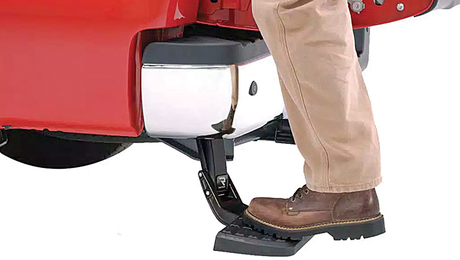*
What is the best grout for wall tile? Is sanded grout with 1/8 ince spacers the best way to go. Or should I go with the Latex grout and no spacers.Which way will last longer,and won’t have a tendecy to discolor.
Discussion Forum
Discussion Forum
Up Next
Video Shorts
Featured Story

The RealTruck AMP Research Bedsteps give you easy access to your truck-bed storage.
Featured Video
Video: Build a Fireplace, Brick by BrickHighlights
"I have learned so much thanks to the searchable articles on the FHB website. I can confidently say that I expect to be a life-long subscriber." - M.K.














Replies
*
chuck
I haven't used water for anything but cleanup for 10 years or more. I use Hydroment brand acrylic admixture in my thinset and grout, both sanded and unsanded.
I consider it cheap insurance against cracking grout lines and it makes a stronger, more flexible mix in thinset.
It seems to be more stain resistant than water-mixed grout but not impervious. There are stain "resistant" top coats to put on over dry grout but they must be recoated every 6 months or so. Also there are commercial/industrial grade coatings which are quite effective, but they give the grout a varnished look and are quite pricey <@$150/gal>.
I have tile kitchen counters and bathrooms in my own house and find the best approach is to avoid white grout and clean as you go.
I pay about $9/gal for the acrylic in 5 gal buckets. If you figure the cost of the admix as a percentage of the total cost of a good tile job, I feel it is a minimal investment for a much more durable job.
As for grout lines, I usually go with the tight <1> lines in bathrooms cause there's just less grout to clean. Also the unsanded grout is easier to scrub when you have to.
Hope this helps.
George Buehler
Freehand Design&Craft
Pocatello, ID
*Chuck's right, a tighter grout joint and unsanded grout is the way to go, unsanded grout tends to discolor less since there is no sand to interfere with the color mixing, and smaller joints look better and are easier to keep clean. But I would disagree with the sealing advice though, Tile Lab makes a grout "Penetrating" grout sealer which will last for several years, just stay away from silicone based sealers.And DO use the admix, like chuck said it's cheap insurance.Of course I pay $18 for 5 gallons, guese I need to shop suppliers.Tim JarrettJarrett's Hardwood & Tile
*
What is the best grout for wall tile? Is sanded grout with 1/8 ince spacers the best way to go. Or should I go with the Latex grout and no spacers.Which way will last longer,and won't have a tendecy to discolor.
*
I guess I got lost there. Simply put, use unsanded grout for walls, sanded grout for floors. Difference is the strength needed for the wider grout joint in floor tile. Michael Byrne (author of Taunton's "Setting Tile") uses one sixteenth inch as the transition point for sanded versus unsanded. Most wall tiles have built-in ears to space the tiles sufficiently for grouting after you butt them together. Get your grout sealer from a professional supplier, as Tim implies.